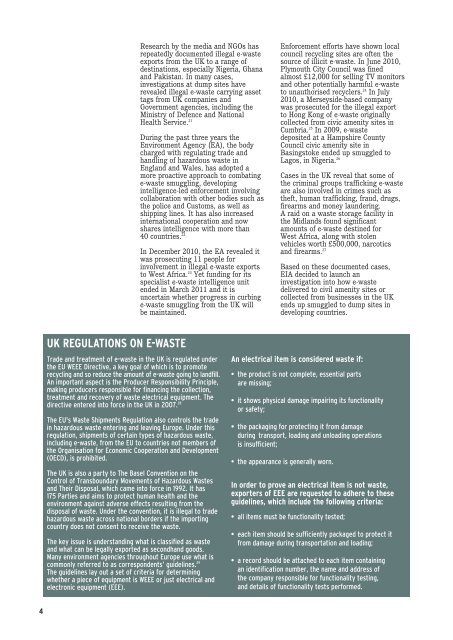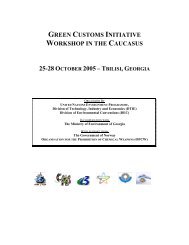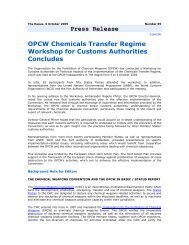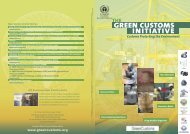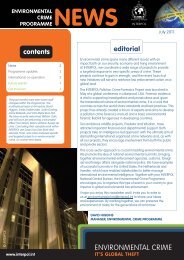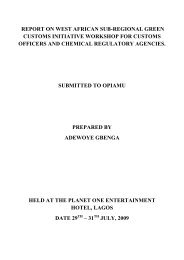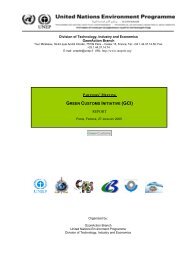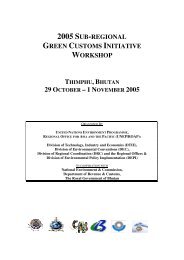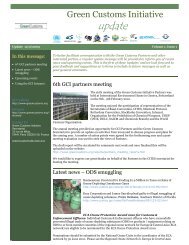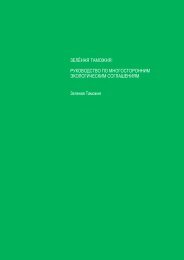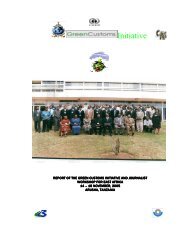EIA, "System Failure" - Green Customs Initiative
EIA, "System Failure" - Green Customs Initiative
EIA, "System Failure" - Green Customs Initiative
Create successful ePaper yourself
Turn your PDF publications into a flip-book with our unique Google optimized e-Paper software.
4<br />
UK REGULATIONS ON E-WASTE<br />
Research by the media and NGOs has<br />
repeatedly documented illegal e-waste<br />
exports from the UK to a range of<br />
destinations, especially Nigeria, Ghana<br />
and Pakistan. In many cases,<br />
investigations at dump sites have<br />
revealed illegal e-waste carrying asset<br />
tags from UK companies and<br />
Government agencies, including the<br />
Ministry of Defence and National<br />
Health Service. 21<br />
During the past three years the<br />
Environment Agency (EA), the body<br />
charged with regulating trade and<br />
handling of hazardous waste in<br />
England and Wales, has adopted a<br />
more proactive approach to combating<br />
e-waste smuggling, developing<br />
intelligence-led enforcement involving<br />
collaboration with other bodies such as<br />
the police and <strong>Customs</strong>, as well as<br />
shipping lines. It has also increased<br />
international cooperation and now<br />
shares intelligence with more than<br />
40 countries. 22<br />
In December 2010, the EA revealed it<br />
was prosecuting 11 people for<br />
involvement in illegal e-waste exports<br />
to West Africa. 23 Yet funding for its<br />
specialist e-waste intelligence unit<br />
ended in March 2011 and it is<br />
uncertain whether progress in curbing<br />
e-waste smuggling from the UK will<br />
be maintained.<br />
Trade and treatment of e-waste in the UK is regulated under<br />
the EU WEEE Directive, a key goal of which is to promote<br />
recycling and so reduce the amount of e-waste going to landfill.<br />
An important aspect is the Producer Responsibility Principle,<br />
making producers responsible for financing the collection,<br />
treatment and recovery of waste electrical equipment. The<br />
directive entered into force in the UK in 2007. 28<br />
The EU's Waste Shipments Regulation also controls the trade<br />
in hazardous waste entering and leaving Europe. Under this<br />
regulation, shipments of certain types of hazardous waste,<br />
including e-waste, from the EU to countries not members of<br />
the Organisation for Economic Cooperation and Development<br />
(OECD), is prohibited.<br />
The UK is also a party to The Basel Convention on the<br />
Control of Transboundary Movements of Hazardous Wastes<br />
and Their Disposal, which came into force in 1992. It has<br />
175 Parties and aims to protect human health and the<br />
environment against adverse effects resulting from the<br />
disposal of waste. Under the convention, it is illegal to trade<br />
hazardous waste across national borders if the importing<br />
country does not consent to receive the waste.<br />
The key issue is understanding what is classified as waste<br />
and what can be legally exported as secondhand goods.<br />
Many environment agencies throughout Europe use what is<br />
commonly referred to as correspondents’ guidelines. 29<br />
The guidelines lay out a set of criteria for determining<br />
whether a piece of equipment is WEEE or just electrical and<br />
electronic equipment (EEE).<br />
Enforcement efforts have shown local<br />
council recycling sites are often the<br />
source of illicit e-waste. In June 2010,<br />
Plymouth City Council was fined<br />
almost £12,000 for selling TV monitors<br />
and other potentially harmful e-waste<br />
to unauthorised recyclers. 24 In July<br />
2010, a Merseyside-based company<br />
was prosecuted for the illegal export<br />
to Hong Kong of e-waste originally<br />
collected from civic amenity sites in<br />
Cumbria. 25 In 2009, e-waste<br />
deposited at a Hampshire County<br />
Council civic amenity site in<br />
Basingstoke ended up smuggled to<br />
Lagos, in Nigeria. 26<br />
Cases in the UK reveal that some of<br />
the criminal groups trafficking e-waste<br />
are also involved in crimes such as<br />
theft, human trafficking, fraud, drugs,<br />
firearms and money laundering.<br />
A raid on a waste storage facility in<br />
the Midlands found significant<br />
amounts of e-waste destined for<br />
West Africa, along with stolen<br />
vehicles worth £500,000, narcotics<br />
and firearms. 27<br />
Based on these documented cases,<br />
<strong>EIA</strong> decided to launch an<br />
investigation into how e-waste<br />
delivered to civil amenity sites or<br />
collected from businesses in the UK<br />
ends up smuggled to dump sites in<br />
developing countries.<br />
An electrical item is considered waste if:<br />
• the product is not complete, essential parts<br />
are missing;<br />
• it shows physical damage impairing its functionality<br />
or safety;<br />
• the packaging for protecting it from damage<br />
during transport, loading and unloading operations<br />
is insufficient;<br />
• the appearance is generally worn.<br />
In order to prove an electrical item is not waste,<br />
exporters of EEE are requested to adhere to these<br />
guidelines, which include the following criteria:<br />
• all items must be functionality tested;<br />
• each item should be sufficiently packaged to protect it<br />
from damage during transportation and loading;<br />
• a record should be attached to each item containing<br />
an identification number, the name and address of<br />
the company responsible for functionality testing,<br />
and details of functionality tests performed.


